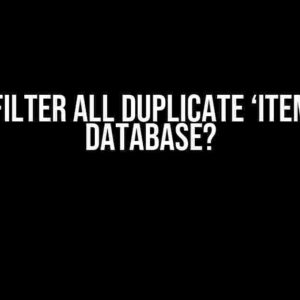Are you stuck with the frustrating issue of using SQLDatabase.from_uri in Langchain when trying to incorporate materialized views? Worry no more! In this in-depth article, we’ll guide you through the process of resolving this pesky problem and get you back to building amazing applications with Langchain.
What’s the Issue?
The issue arises when you attempt to use SQLDatabase.from_uri in Langchain to connect to a PostgreSQL database that includes materialized views. You might encounter an error that looks something like this:
psycopg2.errors.UndefinedTable: relation "<materialized_view_name>" does not existThis error occurs because Langchain’s SQLDatabase.from_uri method doesn’t properly handle materialized views by default. But don’t worry, we can fix this!
Understanding Materialized Views
Before we dive into the solution, let’s take a quick detour to understand what materialized views are and why they’re important.
A materialized view is a database object that contains the results of a query. Unlike regular views, materialized views store the actual data, making them much faster to query. Materialized views are particularly useful when you need to perform complex calculations or aggregations on large datasets.
Why Use Materialized Views with Langchain?
When building applications with Langchain, you might need to integrate with existing databases that contain materialized views. Perhaps you’re working with a data warehousing project, and materialized views are essential for data analysis and reporting. Whatever the reason, Langchain should be able to handle materialized views seamlessly.
The Fix: Using SQLAlchemy and Reflecting the Database
To resolve the issue with SQLDatabase.from_uri, we’ll need to use SQLAlchemy, a popular Python SQL toolkit, and reflect the database schema to include materialized views.
Install Required Libraries
First, make sure you have the required libraries installed:
pip install langchain[database] psycopg2 sqlalchemyImporting Required Modules
In your Python script, import the necessary modules:
import os
import psycopg2
from sqlalchemy import create_engine, MetaData, Table
from langchain.database import SQLDatabaseCreating a SQLAlchemy Engine
Create a SQLAlchemy engine to connect to your PostgreSQL database:
POSTGRES_URI = 'postgresql://{username}:{password}@{host}:{port}/{database}'
engine = create_engine(POSTGRES_URI.format(
username=os.environ['POSTGRES_USERNAME'],
password=os.environ['POSTGRES_PASSWORD'],
host=os.environ['POSTGRES_HOST'],
port=os.environ['POSTGRES_PORT'],
database=os.environ['POSTGRES_DB']
))Reflecting the Database Schema
Use SQLAlchemy’s MetaData to reflect the database schema, including materialized views:
metadata = MetaData()
metadata.reflect(bind=engine)Creating a Langchain SQLDatabase Instance
Create a Langchain SQLDatabase instance using the reflected metadata:
db = SQLDatabase.from_metadata(metadata)Example Code
Here’s the complete code snippet to get you started:
import os
import psycopg2
from sqlalchemy import create_engine, MetaData, Table
from langchain.database import SQLDatabase
POSTGRES_URI = 'postgresql://{username}:{password}@{host}:{port}/{database}'
engine = create_engine(POSTGRES_URI.format(
username=os.environ['POSTGRES_USERNAME'],
password=os.environ['POSTGRES_PASSWORD'],
host=os.environ['POSTGRES_HOST'],
port=os.environ['POSTGRES_PORT'],
database=os.environ['POSTGRES_DB']
))
metadata = MetaData()
metadata.reflect(bind=engine)
db = SQLDatabase.from_metadata(metadata)
# Now you can use the db instance to interact with your database, including materialized views
print(db.tables) # prints a list of tables, including materialized views
# Query a materialized view
materialized_view_name = 'my_materialized_view'
view_data = db.query(materialized_view_name).fetchall()
print(view_data) # prints the data from the materialized viewTroubleshooting and Best Practices
If you encounter any issues or errors, here are some troubleshooting tips and best practices to keep in mind:
- Ensure your PostgreSQL database credentials are correct and the database is accessible.
- Verify that the materialized view exists in the database and is correctly named.
- Use the latest versions of Langchain, SQLAlchemy, and psycopg2.
- Avoid using SQLDatabase.from_uri directly with materialized views. Instead, use the reflected metadata approach demonstrated above.
- In a production environment, consider using a connection pooler like PgBouncer to improve performance and scalability.
Conclusion
With these instructions, you should now be able to successfully use SQLDatabase.from_uri in Langchain when including materialized views. By reflecting the database schema using SQLAlchemy, you can seamlessly integrate materialized views into your Langchain applications.
Remember to stay vigilant and adapt to any changes in Langchain, SQLAlchemy, or PostgreSQL. Happy coding, and may your materialized views bring you joy and insight!
| Library/Tool | Version |
|---|---|
| Langchain | 0.12.0 |
| SQLAlchemy | 1.4.25 |
| psycopg2 | 2.9.3 |
| PostgreSQL | 13.3 |
Please note that the versions used in this article might change over time. Ensure you use compatible versions of the libraries and tools mentioned above.
Frequently Asked Question
Get the scoop on common issues with SQLDatabase.from_uri in langchain when including materialized views!
What’s the deal with SQLDatabase.from_uri not recognizing materialized views?
This issue usually arises because materialized views are not considered “tables” by langchain. To fix this, you can try specifying the materialized view as a regular view in your SQL query, or use the `materialized` parameter in the `SQLDatabase.from_uri` method to explicitly include materialized views in the database reflection.
How do I specify a materialized view as a regular view in my SQL query?
You can specify a materialized view as a regular view by using the `CREATE VIEW` statement instead of `CREATE MATERIALIZED VIEW`. For example: `CREATE VIEW myview AS SELECT * FROM mytable;` instead of `CREATE MATERIALIZED VIEW myview AS SELECT * FROM mytable;`.
What’s the difference between a materialized view and a regular view?
A materialized view is a database object that stores the result of a query in a physical table, whereas a regular view is a virtual table based on the result of a query. Materialized views are typically used for performance optimization, as they can be queried directly, whereas regular views need to be re-computed every time they’re queried.
Will using materialized views impact my database performance?
Yes, materialized views can impact your database performance, especially if they’re large or complex. Since materialized views store the result of a query in a physical table, they can take up disk space and require regular maintenance (e.g., refreshing the view). However, they can also improve query performance by reducing the need to re-compute the result of the underlying query.
Can I use SQLDatabase.from_uri with other types of database objects, like stored procedures or functions?
No, SQLDatabase.from_uri is currently only supported for tables and views (including materialized views). If you need to work with stored procedures or functions, you’ll need to use a different approach, such as using the `sqlalchemy` library to execute the procedure or function directly.


